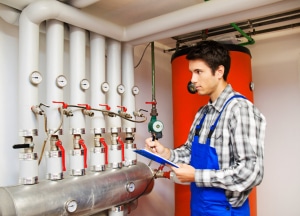Is it time to replace your boiler? You have a few weeks before the worst of the winter weather kicks in, which is good news for you—such an investment demands you do your homework. A boiler will last for many years with an average life expectancy of two decades or more. That means you’ll be living with your new boiler for quite a while, and you don’t want to make the wrong choice. Today’s boilers come with a variety of efficiency ratings, performance factors and price points that can influence which boiler you choose.

The first order of business is figuring out the Annual Fuel Utilization Efficiency (AFUE) factor. This is how you gauge the efficiency of boilers via a percentage. For example, an 85 percent AFUE boiler utilizes 85 percent of the fuel to create heat, but the other 15 percent is lost either through venting or as part of the combustion process. Federal requirements demand a minimum standard, but you don’t need to settle for the bare minimum—while gas boilers require at least 80 percent AFUE and steam boilers require 75 percent AFUE, opting for a better efficiency will save you money and lower your energy consumption in the long haul.
Should You Condense?
Any boiler with an AFUE over 90 percent is called a “condensing boiler.” These systems use two heat exchangers to create heat. The first exchanger combines air and fuel, but some heat gets lost via condensation and combustion. That’s where the next heat exchanger kicks in, collecting lost energy and re-purposing it as heat.
Whether you choose a condensing boiler or another high-efficiency option, know that you’ll be ponying up more cash up front. However, bear in mind that energy savings increase with higher AFUE rating thanks to high tech features. The second the system is installed, you’re already saving on fuel. Plus, you’ll enjoy a lighter carbon footprint, which is a must for many green-minded consumers (and those karmic brownie points don’t hurt, either).
You Get What You Pay For
Depending on where you live, maintaining a comfortable home in the winter can be well worth the up front cost of a high tech boiler. Those making it through a chilly winter in Utah really need an efficient boiler, while those who call Hawaii home can make do with a less efficient model. However, also remember that the overall lifetime costs of an efficient boiler are lower. Lower repair costs, a more durable system and reduced fuel costs each month add up in all the right ways.
Work with a Roberts Mechanical for an energy audit to assess window efficiency, insulation levels of the home, the property’s orientation and general airtightness to maximize the benefits of a boiler. This is going to be one serious long-term relationship, so make sure you find your perfect match to really start heating things up.
